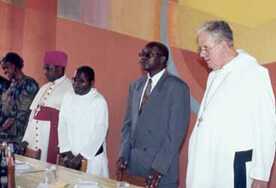
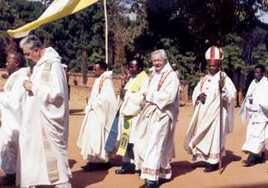
|
For your love is better than life, my lips will speak your praise, So I will b less you all my life, in our name I will lift up my hands. My soul shall be filled as with a banquet, my mouth shall praise you with joy. (Psalm 62) |
| A panoramic Briefing on the Religious Congregations , Men and Women Religious who are part and parcel of the Family of God in Songea Archdiocese. |
| 1. Missionary Benedictine Monks (Priests and Brothers) of the Congregation of St. Ottilien |
 |
 |
| This is the pioneer and founder Congregation of the catholic faith in our Archdiocese. They are the Benedictine Monks- Fathers and Brothers. It all started with the first two missionaries, Rev. Fr. Cassian Spiss OSB and Rev. Br. Laurent Brenner OSB. They are the first two heroes who came to the Village of Mbinga Mharule and after a short time, on 31st July 1898 moved over to and founded the first mission station on Peramiho Hill. |
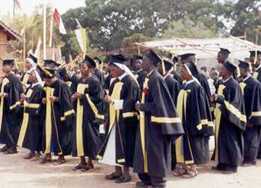 |
They started by constructing three wooden-mud and grass huts, they started learning swahili language and at the same time talking to the local people about Jesus Christ. It took them a year to get the first converts baptized. Since then, for many years up to the nineteen seventies, the Benedictine Missionaries have been the principal team of personnel for evangelization. To them we owe the foundation of almost all Parishes, The Major and Minor Seminaries,Religious Institutes and educational and health institutions and facilities. In 1928 Fr. Severin Hofbauer founded the preparatory seminary in Peramiho which later moved to Kigonsera as a minor seminary. Kigonsera later developed and gave rise to Peramiho Major Seminary, Likonde Junior Seminary, Hanga Minor Seminary and Kigonsera Secondary School .The most important Religious Institutes founded by them are the present Congregation of Benedictine Sisters of St. Agnes Chipole in 1938, and the African Benedictines Abbey of Hanga in 1957. |
| They also established many primary and middle schools in several Parishes. By 1967 there were 870 schools of which 126 were mission schools registered by the Government. At the Abbey in Peramiho they had established Peramiho Teachers College which later moved to Songea Teachers College, Peramiho Trade School with Workshops for tailoring, mechanics, electric installations, shoemaking, carpentry, masonry, and printing with bookbinding, a Nurses Training School and a Bookshop. Most important for the people was the establishment of the St. Joseph Hospital which is the most known in southern Tanzania up todate. They also established a leprosarium in Litisha and Morogoro villages a few kilometers west of Peramiho Abbey. Between 1898 and 1968 they had founded 51 Parishes of the then Diocese of Peramiho which in 1968 was divided into two Dioceses - Peramiho and Njombe. The following year the Diocese of Peramiho changed the name to Songea Diocese. These zealous missionaries continued to evangelize in the two Dioceses. In 1987 Songea Diocese was again divided into two by creating the new Diocese of Mbinga. The Fathers and Brothers were still forming the team of personnel in the three dioceses. By then there were 60 Fathers and 48 Brothers. | 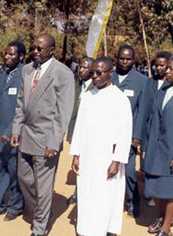 |
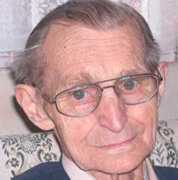
|
However, with time, vocations dwindled in their home country and many of the missionaries gradually advanced in age such that they had to withdraw from the Parishes and Institutions outside the Abbey of Peramiho limiting themselves to work in the institutions in and around Peramiho. By then the fall in vocations to this Congregation was compensated by the increase in the local vocations to the priesthood as well as to religious life. In 1943 Peramiho witnessed the first priestly ordinations of the first two indigineous priests: Fr. Gervas Ntara and Fr. Simon Kapinga. While the number of diocesan priests increased in all the three dioceses, the number of missionaries fell down. At present we have only one St. Ottilien Priest working as a Parish Priest, Rev. P. Benno Schneider OSB, but several others - Priests and Brothers are running and caring for our people in the various institutions in Peramiho, especially in the schools and in the hospital. As they concentrated in their life and work in the Abbey they have made one important advance in their apostolate: They started the formation of indigenous monks of St. Ottilien Congregation. |
| P. Benno Schneider OSB - Parish Priest of Msalaba Mkuu 2004 |
| The fruits of their work are visible in the 11 young Brothers who have made their profession among whom one is a Priest. We have the following still active missionaries of St. Ottilien under the leadership of the present Abbot of Peramiho, Very Rev. Abbot Lambert Doer OSB: |
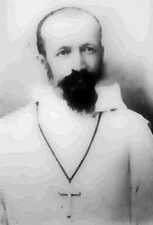 |
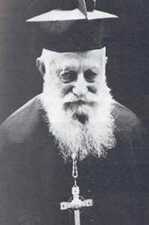 |
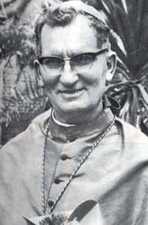 |
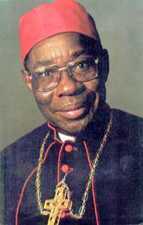 |
| + Cassian Spiss OSB | + Gallus Steiger OSB | +Eberhard Spiess OSB | Askofu Mkuu Yakobo Y. Komba |
| Founder Priest of Our Archdiocese and first Bishop of Dar Es Salaam | First Abbot-Bishop of Our Archdiocese (1933-1952) | Seccond Abbot-Bishop (1952-1969) | Third Bishop of Songea |
| The St. Ottilien Priests are: |
| P. Lucius Marquardt OSB (1930), P. Y. Bosco Brunner OSB (1918), P. Gottlieb Wuerstle OSB (1926), P. Benno Schneider OSB (1925), Erich Lammering OSB (1925), P. Gottfried Rhein OSB (1931), P. Boniface Dinkel OSB (1935), P. Dieter Held OSB (1935), P. Basil Fetz OSB (1941), P. Edwin Lindner OSB (1943), P. Anastasius Reiser OSB ( ), P. Stephen Komba OSB ( ), P. Mligo OSB ( ). |
| The Brothers, still living among us, who have formed and built this Archdiocese are: |
| Br. Nonosus Bleicher OSB (1912), Br. Albert Haas OSB (1924), Br. Edgar Hein OSB (1925), Br. Kunibert Karg OSB (1930), Br. Sebastian Kainzbauer OSB (1934), Br. Meinrad Heinrich OSB (1934), Br. Polycarp Stich OSB (1934), Br. Engelbert Huth OSB (1934), Br. Dietmar Dietrich OSB (1935), Br. Ignaz Laumer OSB (1937), Br. Odo Harrer OSB (1938), Br. Dominicus Weis OSB (1942). |
| These Brothers are very much known in the Archdiocese for their long time services in the various workshops and departments in Peramiho Abbey which in one way or the other do support the life and various activities of the Church. Br. Nonosus Bleicher OSB is remembered for his nice work in establishing the Monastery of Hanga Abbey in its infant days. He is also known for managing the godown for flower and grain for all institutions in Peramiho. He is the oldest monk we have - our Grandfather. Brother Edgar OSB is very much known as the pillar of the Tailoring workshop for now 50 years. He has trained the best tailors in Southern Tanzania - men and women. Br. Albert Haas OSB is not only a carpenter, but a successful trainer of carpenters for furniture and for house woodwork constructions. Br. Kunibert Karg OSB has his name written on the walls of Manda Parish, Njombe Cathedral Church, Peramiho Hospital etc. He is a famous mason and planner for buildings. We are told that he started as a gardener and ended up as a mason. Bruder Sebastian Kainsbauer OSB is in the hearts of the faithful of the Parish of Msalaba Mkuu because he is the one who constructed that Church during the time of P. Suso OSB. He is now maintaining and caring for the water turbines in Likingo to ensure that energy and power are available for life in Peramiho and institutions. Our Brother Meinrad Heinrich OSB, also known as Pinzelzep is ever important for us for building and repairing our churches, for installing bells, for repairs of our various religious statutes, for repair and repainting of the inside of churches. He has a special sense and charism of color and beauty, aesthetics and symmetry. He is also known for playing harmonium and organ in the Church. The Procure of the Abbey, for almost 100 years has always been the resource point for our priests, religious and laity from almost all Parishes. There have been Brothers working very untiringly for the necessary provisions. In the finance section there is now the most known Brother Engelbert Huth OSB and for procuring materials and needs it is Brother Dietmar Dietrich OSB. Brother Polycarp Stich OSB, pupularly known as Bambo Gama is important to the Church of Tanzania as goldsmith for almost all church items, manager of the Printing Press in Peramiho, a musician as a violinist and singer in the choir, and Mngoni by adoption because of his talent of having learnt kingoni language of the natives here and for having the knowledge and feeling of the culture and history of the same local people. Brother Ignas Laumer OSB knows almost all planks, beams and rafters on the roofs of all our Churches and chapels and community houses. While Brother Albert is often in the school of the carpenters, Brother Ignas is often away in the various building sites to undertake the roofing and fitting of new buildings. And Brother Oddo Harrer OSB is everyday in the mechanical workshop to fix und unfix all screws, nuts of all the engines of our cars, motorbikes, generators, tractors, grinding mills, etc etc. He does a good job always. For the bookshop, Brother Dominic Weis OSB, is very much known. In Songea, Mbinga and Njombe Diocese he is also very much remembered because of his work of forming catechists for the church. Brother Herman Mayr OSB: from him we have learned animal husbandry and from him our people have bought cows, oxen, pigs as well as donkeys. He is the supplier as well as the trainer for animal farming. |
| And our Missionary Brothers who have been called back to their mother monasteries to take other tasks: |
| the famous Dr. Br. Ansgar Stufe OSB Directing Manager of Peramiho Hospital now chief Procurator in St. Ottilien, Br. Victor Kalberer OSB after long time service in the Mechanical Workshop is now Procurator in Uznach, Br. Arthur Grawehr OSB from whom we learnt how to produce sausages and hem is now in Uznach Procure. Together with these Fathers and Brothers from Germany there are now the young african Brothers who have joined this Congregation and are gradually taking over the work and service of these golden souls. There are now 11 perpetually professed Brothers and 15 with temporary vows. They bring the new and young blood in the Abbey. They have started to understudy their elder brothers so that they can gradually take over the various activities. In this way the work of the missionaries continues in the hands of their younger brothers. |
| 2. Missionary Benedictine Sisters of Tutzing |
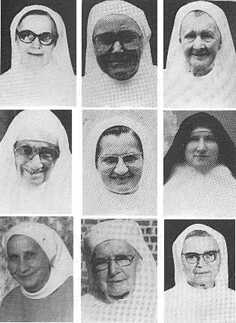 |
The second important Religious Congregation is that of the Missionary Benedictine Sisters of Tutzing whose priory is in Peramiho. Both Congregations started their mission here in Tanzania and they are the pioneers. They brought our Faith here in the South of Tanzania, in particular here in Songea. The Prioress is Rev. Sr. M. Pia Portmann OSB. As it is with the Congregation of the Fathers and Brothers, the majority of the founder sisters are now in an advanced age. But the Congregation has had the fortune of getting local vocations. We have now 28 indigenous sisters and 22 founder sisters. This Institute of the Benedictine Missionary Sisters of Tutzing has been founded by the same person who founded the Missionaries of St. Ottilien, namely, the Reverend P. Amrhein OSB. They first came to Tanzania in 1888 in Pugu, Dar Es Salaam. In 1901 they came to Peramiho (28 Km west of Songea) and started working together with the missionary Father Cassian Spiss and Brother Laurent Brenner. They were fully involved in the catechetical work of preparing catechumens for the sacraments, in teaching religion and in the various social services for the poor as well as in schools and health services. Just now you will see them first in Peramiho St. Scholastica Priory, in Peramiho Hospital, in Morogoro Leprosarium, in Peramiho Girls School. They are intending to come to work in Mjimwema Parish in Songea in the near future. |
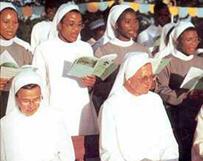 |
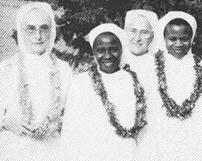 |
| 3. The African Benedictines of Hanga |
| A local Congregation of men religious numbering about 126 monks who are professed. The Abbey is about 45 km north east of Songea. It was founded in 1957 by the late +Eberhard Spiess OSB the then Bishop and Abbot of Peramiho. It is a Community of Monks which has managed to do a lot of things on its own, thus bringing them to maturity. As Monks one admires how they are keen to a well ordered Liturgy. They are also experts in many handworks including carpentry, plumbering, tailoring, masonry, mechanical services etc. They have a Minor Seminary from Form One to Form Four, a public Secondary School for boys and girls, an excellent Kindergarten which is being promoted into an English medium Primary School. While the majority are religious Brothers, yet the number of clergy in the Congregation is increasing. The Monastery grew from a simple House, to a simple Priory, to a Conventual Priory, and in 1996 they got the first Abbot, Very Reverend Abbot Alcuin Nyirenda, and this year, on 14th January 2004 they had elections again and got their second Abbot in the person of Very Reverend Abbot Thadei Mhagama OSB. They have good vocations. |
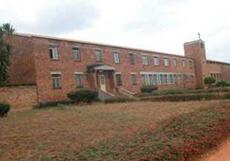 |
 |
 |
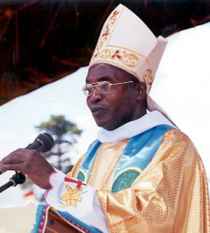 |
Bishop Emeritus |
| 4. The Benedictine Sisters of St. Agnes, Chipole |
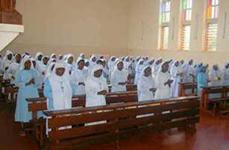 |
 |
|
Founded by Bishop Gallus Steiger in 1938, a diocesan Congregation, being the first one to inherit the spirit and Rule of St. Benedict from our Missionary Congregations. They attracted many vocations which made the Congregation to grow rapidly such that a second Community of the same had been established in Njombe Diocese. Just now they number about 700 Sisters. They live the Spirit of Ora et Labora, they try to excel in Liturgy, and they undertake all types of manual works for their own sustanance and for rendering their services to people of all walks of life. They practice the vows of poverty by working hard to earn their living for the entire community and also to be able to contribute to the poor. Upon celebrating their 50 Anniversary the Institute resolved to start a Girls Secondary School which they are managing and running since more that a dozen years. They run also a Primary School and a Trade School for Tailoring, Carpentry, Shoemaking, Plumbering and Mechanics. Their Mother House is in Chipole and the Generalate in Songea Township. Since recent years they have managed to embark on mission work by being sent to some Dioceses: Tunduru-Masasi, Singida, Mbulu and Dar Es Salaam. Last year they managed to send sisters to work in the United States. |
 |
| 5. The Poor Clares Colletines of Ruhuwiko |
 |
They are now 12. They live and follow the spirit of St. Francis of Assis, in a particular way - the way it was lived by St. Clare. They are now more than 20 years in the Archdiocese. They first lived in the small monastery at Lusonga and later moved to Ruhuwiko where better houses were prepared for them. Their small monastery is the oven and kitchen for the spiritual graces of the entire Archdiocese. |
| Sr. Catherine- Local Superior |
| 6. The St. Vincent Sisters |
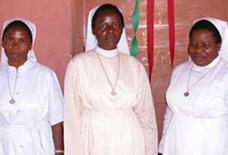 |
 |
 |
| The St. Vincent Sisters who are working first in our school of the death and dumb in Ruhuwiko. They are also stationed in Namabengo Parish, in Matimira Parish and in Ligunga Parish. They are now numbering 33 in the Archdiocese. Their Charism for the poor is manifested in a very particular way in the school of the Deaf and Dumb, in the Nursery education which they undertake in all the Parishes where they are staying. They are also good at social work for girls in the form of Domestic schools. In Ligunga, since three years they are running a Boarding house for the Primary school girls with the objective of helping the poor gilrs of the rural areas to get an atmosphere of study and reading in the evening and in this way to prepare themselves better for their academic pursuits in the class rooms. We hope from among these girls a number of them will pass their state examinations and so be able to go to secondary education. They opted to work in the Diaspora Parishes of Ligunga and Namabengo since many years and now they are waiting to go to start work and life in Ligera Parish. |
| 7. The Diocesan Congregation of Benedictine Brothers of St. Paul in Lighano Minor Seminary |
| They are now numbering 21. Founded by His Grace Archbishop James J. Komba in 1983. They follow the spirit of St. Benedict in accordance with his Rule, they want to live an apostolic and pastoral life in the example of St. Paul the Apostle of the Gentiles. An Institute of Diocesan Rite. | 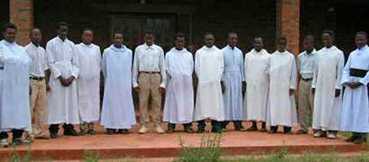 |
 |
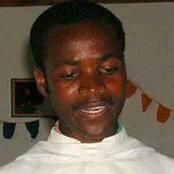 |
| 8. The Augustinian Fathers and Brothers of Mahanje |
| In their mission to East Africa they first landed in this Archdiocese. They are residing in Mahanje Parish. There they have a small formation House for Aspirants and also as an upcountry home for all the Augustinians. Of late they have a House in Dar Es Salaam and in Morogoro for the scholasticates. Four Tanzanian Augustinians have already been ordained Priests, the others have opted to remain as Brothers. In Mahanje they undertake the day to day pastoral work, not only for their young people, but they are fully responsible for the spiritual and pastoral care of all the faithful of Mhanje and therefore one priest is always the Parish Priest. Under the wise leadership of Rev. Fr. Olea Theodomiro, they have managed to build a very nice Dispensary at Mkongotema Village, they have supported very strongly in the construction of Lutukira Primary School as well as those of Madaba and Mahanje. The Outstation Church of Lutukira Village is also reason for complimenting them highly. |
 |
 |
| Fr. Peter Msomba OSA at his Ordination | Fr. Olea Theodomiro OSA |
| 9. The Augustinian Sisters of Wino |
| They are at present 10 Sisters with perpetual vows and the rest have temporary vows. With serious dedication they run a school for Nursery teachers at Wino, they manage and direct the Dispensary at Mahanje. They are keen to keep the Church and accompany young people in their lives. Their presence is limited to Wino and Mahanje Parishes in the North of the Archdiocese. This has been the second Congregation from Overseas to come to the diocese. |
| 10. The Sisters Of Visitation Congregation of Alleppey (SVCA) |
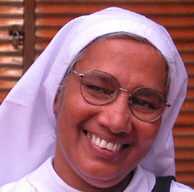 |
 |
| Sr. Gina SVCA (Local Superior) | Sr. Littleflower SVCA, Nurse in Mkongo Dispensary |
| They first arrived as missionaries to Tanzania, Songea Archdiocese in the year 2000. Originally a Congregation of Diocesan Right, but last year 2003 it became of Pontifical Right. Todate, 2004, there are eight Sisters working in our Archdiocese. They are stationed in Lighano Seminary, in Mkongo Parish, and in Bombambili Parish. |
| Deeply conscious of the mission of the religious congregations in forming and developing christian life, fully aware of the needs of the society and touched profoundly by his devotion to the Sacred Hear of Jesus, moved by the spitituality and apostolate of the Visitation Congregation founded by St. Francis de Sales and St. Jane de Chantal in France, Fr. Sebastian L.C. Presentation, a diocesan priest of Alleppey, with the permission of the ecclesiastical authorities started this Congregation on 29th January 1924 at Kantoor, in Kerala-India. Sisters of Visitation Congregation of Alleppey were canonically erected as a diocesan Congregation in 1945. It is a religious institute of diocesan right (Latin), apostolic and missionary in character. |  |
 |
Through our apostolate and missionary activities, we dedicate ourselves to be deeply ecclesial, to meet the needs of the Church according to the signs of the times. The Spirit of the Congregation is centered on the love experience of Jesus on the Cross who emberaced the will of the Father most generously in humility and meekness. The perfect example of this is found in the Blessed Virgin Mary. We practise deep humility before God and gentleness towards our neighbour. The primary charism of the Congregation is education and formation of children and youth, particularly of girls, with a special love and concern for the poor among them. We make the best use of Catholic schools as a place of training for life and evangelization. |
| Evangelization: Through Basic Christian Communities (BCC) and Catechesis, Pastoral activities of the local Church. |
| Ministry to the Sick: Render services to the sick in hospitals, in dispensaries and in clinics, especially in the villages and rural areas where the facilities of medical care are not available. |
| Ministry to the aged: Run Homes for the Aged and Girls Homes for the girls who are waifs and strays who badly need our assistance and support for their human and spiritual growth. |
| Social Apostolate: The Aim of our apostolate is to animate and transform our society according to the gospel values. We organize socio economic developmental works, liberative and consicentising movements among different sections of people especially of women. It includes job-oriented programs, housing projects, Visitation Family Welfare Schemes, Saving Schemes etc. |
| Missionary Apostolate: We participate in the missionary apostolate of the Church in the places, where Catholic faith has not yet taken roots and among the people who are still ignorant of Christ. |
| Mission in Africa: Sisters of Visitation Congregation of Alleppey started their mission in Africa in the year 2000 when the first batch of three Sisters arrived on 3rd December 2000 in the Archdiocese of Songea, Tanzania. The pioneers were Sr. Rita, Sr. Rose and Sr. Sophie. Now, in the year 2004, there are six sisters who are actively involved in different activities of the Church. The first missionary apostolate of the Visitation Sisters began at Lighano Minor Seminary, where two Sisters are involved in the formation of the seminarians and one is dedicating her valuable service at the dispensary of the the seminary. And in the year 2003, the Visitation Sisters made another landmark in their history of Tanzania mission by opening another mission station in Bombambili Parish where there are two sisters who are fully engaged in different pastoral and educational activities of the parish. One sister is teaching in the Holy Family Kindergarten and the other one is devoting her time in forming young girls in the Domestic School. And both are involved in different pastoral activities of the parish, visiting families, taking care of the sick people, visiting villages etc. And on 14th January 2004 we started our third mission station at Mkongo Parish where three sisters will be working in the Dispensary. This Parish is in the diaspora part of the Archdiocese, namely, in the part where the majority are Moslems and the minority are Catholics. The coexistence between Moslems and Christians here is very amicable. We want to work with them and among them and contribute what we can in promoting health and social life. |
| Jesus invites us to take part in the mission of the Church, making known His word to the people of Africa, by being a sign of hope and consolation to the less fortunate ones and showing the true way to Christ, our Saviour, through our lives and teaching. |
| 11. Ursuline Sisters of Mary Immaculate (UMI) |
| The Ursuline Sisters of Mary Immaculate. Just now they are eight in number. They work as missionaries in education in Songea urban: Two of them are teaching in the diocesan St. Joseph Primary School, two of them in the diocesan Kindergaten. The other four are new arrivals who will start their apostolate in Mpandangindo Parish in February 2004. The first three arrivals came in the year 2001. They are Sr. Gina, Sr. Alinda and Sr. Succorine. |
 |
 |
 |
| Sr. Geena UMI, an Ursuline teaching in St. Joseph Primary School | Ursuline Sisters in their House Chapel | Ursulines upon their arrival in Songea |
| 12. The Congregation of Sisters of St. Joseph of Chamberry |
 |
They are four. Sr. Celine, Sr. Mariane, Sr. Uralia, Sr. Agnes. |
| 13. Society of Daughters of Mary Immaculate and Collaborators (DMI) |
|
Rev. Sr. Virginamalli -Superior General |
DMI Sisters in prayer and a song |
||
| The Society of Daughters of Mary Immaculate and Collaborators (DMI), is a Society of Apostolic life of women. It started with the blessings of the Archbishop of Madres-Mylapore and the congregation of the Oblates of Mary Immaculate. DMI is dedicated to take part in the sufferings and struggles of the poor and to serve them unconditionally. DMI is committed to reach out the unreached who live in human bondage of ignorance, inequality, and economic and social slavery in rural, tribal and urban areas. | 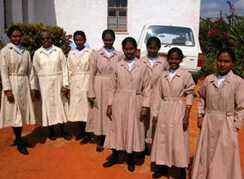 |
||
| OUR SOCIETY DMI was founded by Fr.Arul Raj OMI, along with Sr.Josephine DMI in 1984 in a remote village called Pandravedu about 120km from Chennai. At present, DMI has got 345 committed and dedicated young women as members and 173 persons in various stages of formation. There are also 600 paid staff and volunteers who collaborate with us. There are various linguistic groups in DMI such as Tamil, Telugu, Malayalam, Hindi, Kannada and Marathi. |
| OUR MISSION “LOVING GOD IN SERVING THE POOR TO BE FULY ALIVE AND FULY HUMAN” is the Charism and mission of DMI. Helping the poor to find their salvation in their own way, in their own culture and in their own milieu is considered as “New Evangelization” by the Society of DMI. |
| OUR THRUST To enable the poor especially the marginalized women and children to enjoy the Christ given values such as love, justice, peace and equality through an empowerment and capacity building process is the thrust of DMI. |
| AREAS OF OPERATION The activities of DMI have been spread over in 18 dioceses in five Indian states; namely Tamil Nadu, Andhra Pradesh, Bihar, Maharashra and Andaman &Nicobar Islands. DMIs are working in 45 communities, covering more than 1000 villages in the remote parts of the states. |
| MISSIONARIES OF MARY IMMACULATE In order to respond to the challenges of the time in a more appropriate way the Missionaries of Mary Immaculate [MMI], an apostolic union of priests has been founded. It has been officially recognized by the Arch Bishop of Madras Mylapore and the Arch Bishop of Campo Grande – Brazil. The mission of MMI will be in line with the mission of DMI to reach the unreached and the neglected. The society of MMI was started not to increase the number of priests but to create more missionaries who could really share the values of Christ with the poor. The Evangelical perspective of the society of MMI is humanization and emancipation of the poor who are in bondage. The MMI process is viewed as one of the DMI’s continued efforts in the field of “evangelization today” which includes evangelization as well as re-evangelization in places like Latin America. With regard to the financial and infrastructural commitments of MMI, the DMI society has promised its support till MMI feels that it can stand on its own feet. |
| PROFESSIONAL TECHNICAL INSTITUTIONS [An effort to promote an Engineering College]All along, the Indian Church has been the leader in the fields of education and health care services. But, at present the demands are rather different in the New World order of globalization. We need to promote more and more professionals and technically qualified persons among the poor if we want to answer need of the poor today, who will respond to the call of “evangelization today” as DMI perceives it. With this rational in our mind, DMI has initiated a process of technical education through its “DMI-college of Engineering & Technology” which is ready and will begin to function from August 2001 onwards. The motive is an appropriate response to the signs of the time. |
| CHALLENGES FACED DMI is facing many barriers in its development process. When the well-organized Church groups were reluctant to enter into difficult and abundant missions, a small as well as a young society of DMI encountering problems in these fields is not surprising. But, in all those trials we felt our heavenly Father’s providence. |
| TARGET GROUP All the programmes and activities of DMI are promoted to address and alleviate the problems of the women and children in the villages and in tribal areas. DMIs serves the people irrespective of their religion, Creed, cast and colour as Jesus did. |
| DMIs AT A GLANCE |  |
| - covering 14,000 women | |
| - formal education in women developmet works (in more than 1000 villages) | |
| - community health education (to 600 groups) | |
| - health care services (hospitals and dispensaries) | |
| - rehabilitation centres for the disabled (3 centres) | |
| - care-homes for orphan children (6 centres) | |
| - micro-economic activities (700 self-help women groups) | |
| - non-formal education (36 centres) |
| - engineering college (1) |
| - literacy programmes in village (150 centres) |
| - access to government programmes (nearly 40 million repees mobilized) |
| - self-help housing programme (465) |
| - promotion of gospel volunteers |
| - formation houses (5) |
| - centres for good news and social work (23) |
| - retreat and pilgrimage centre (1) |
| 14. The Cappuchin Fathers in Ruhuwiko Convent |
| They are three. They are for the spiritual care, of the Community of the Poor Clare Sisters at Ruhuwiko and also for the pastoral care of all the faithful of Ruhuwiko areas. They are the animators and mentors of the Focolare Movement. |
 |
 |
| 15. Carmelite Fathers |
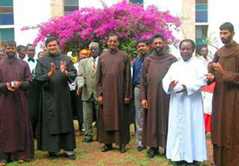 |
On 14th December 2003, we entrusted Mpandangindo Parish to the Carmelite Fathers who had responded generously to our appeal to them to start a mission in Songea Archdiocese. Just now there is one Priest and a Brother at Mpandangindo, but they are planning to undertake more work in future. |
| Rev. Fr. Denis in the centre is the first Carmelite Parish Priest of Mpandangindo. |